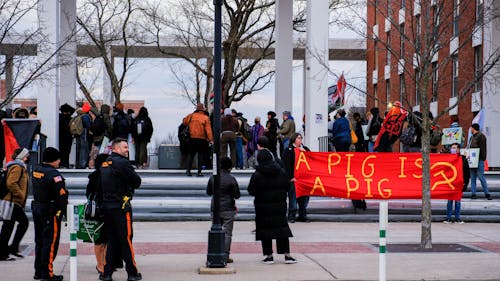U. students, public attend vigil for victims of state violence

Dozens gathered on Thursday to attend a candlelit vigil for victims of state violence, held by various student organizations.
The vigil featured unidentified speakers and later, the floor was opened for the public to voice their thoughts. The first speaker began by naming individuals that died during an Israeli military raid on a refugee camp in Jenin, Palestine.
The second speaker discussed the discrepancies between Indigenous Peruvian's blue-collar work and the lives of the country's metropolitan citizens. They also highlighted the reason why protests are currently occurring in Lima, Peru.
"They don't get the Peru that they're making. They work the land. They make the food. They make the country what it is, but they don't get that at the end of the day," the speaker said.
They said the deaths of Keenan Anderson and Tyre Nichols resulted from the larger issue of policing in the U.S. The speaker concentrated their point on the state’s control over people and private property and questioned the legitimacy of their power.
"It all comes down to ... defending property and ultimately, to upholding the genocide of Indigenous peoples of Peru, the Indigenous peoples of Palestine, of Black Americans here in the U.S.," the speaker said. "Who are not only targeted by racist policing but are also targeted by the military-industrial complex that is using them as free labor and continuing the slave system that has been in this country since the 17th century."
The third speaker reiterated this point when they said state economies, including Arizona, heavily rely on the labor of incarcerated individuals.
Subsequent speakers said they attended this vigil to advocate for the accountability of the U.S. government, the prison industrial complex and governmental policing systems worldwide. All speakers did not state their names when speaking.
Prior to Thursday's gathering, flyers posted around the College Avenue campus, as well as a joint Instagram post from the accounts of the All Marxist-Leninist Union (AMLU) and Students for Justice in Palestine (SJP), informed people of the vigil.
The flyer and the post stated that the gathering would be in remembrance of Tyre Nichols, Keenan Anderson, Manuel "Tortuguita" Terán and LGBTQ+ victims who have died at the hands of police. The flyer also mentioned the victims in Jenin, Palestine, and protestors in Lima, Peru, who were also fatally afflicted by state violence.
A QR code posted on the printed flyers linked to an unattributed document outlining the history of policing in the U.S. and concerns about reproductive and gender-based health care. The document concluded with an explanation of various global issues regarding the police and state agencies.
"As we recognize this violence, we must come together to envision new beginnings. Strong communities don’t need police. We keep us safe," the document stated.
Kehinde Alonge, a teaching assistant and a Ph.D. student in the English Department, said he noticed a flyer about the vigil while walking to class on Wednesday and was glad to see the issues being addressed on campus.
Alonge said he lived in Atlanta, and the news surrounding the Atlanta Public Safety Training Center, commonly referred to as "Cop City," drove him to attend the vigil. He said he feels that the issue in Atlanta may transpire in other cities.
At a local level, Alonge said he thinks government administrations need to redistribute resources to support social assistance programs and test defunding the police.
Anthony Lino-Barbosa, a School of Arts and Sciences junior, said they attended the vigil to advocate for persecuted people worldwide.
While many students may be busy with coursework and other responsibilities, they said it is important to give the time you do have to mourn the lives of the victims of Palestine, Tyre Nichols and Keenan Anderson.
Lino-Barbosa said they learned about the aforementioned tragedies through the members of their fraternity and via social media. They think raising awareness for issues like these on college campuses is crucial.
Regarding the Tyre Nichols case, Alonge said he feels like Nichols' death is an example of the constant issue of violence between people and police, and he wants to see a change.
"I feel like it's a lot more lip service being done by (government) administration than actual action," he said. "I'm tired of the iconography of our death. I’d like to see material action actually arise from (these deaths)."
Editor’s Note: A previous version of this article was titled “All Marxist-Leninist Union, Students for Justice in Palestine hold vigil for victims of state violence.”



